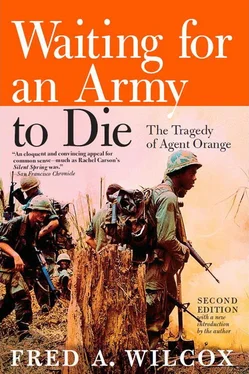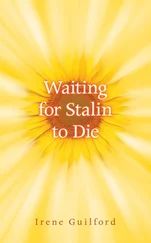In spite of the treatment he has received from the VA, Naples who augments the family income by training attack Doberman pinschers, finds a certain grim humor in the VA’s incompetence. “I went in for a compensation hearing and this doctor had me sit down and he says, ‘Joe, can I see the flamethrower burns?’ I says, ‘What flamethrower burns?’ He says, ‘You were burned by a flamethrower, that’s what those things on your arms are, aren’t they?’ I says, ‘No, I was never burned by a flamethrower; these are rashes that have been comin’ up for the past fourteen years, and every year they intensify. And this is the worst they’ve ever been!’ ‘Oh well,’ he says, ‘I thought they were flamethrower burns.’”
Naples laughs and, after a brief conference with his wife, continues. “Then they tried to tell me it was from the tattoos, the color from the tattoos was causin’ my chloracne. On my legs? I don’t have tattoos on my legs. And then,” laughing, “I go down the hall to see this next doctor and I tell him about the headaches, the stomach cramps, and everything, and he says, and this is exactly what he said, he says, ‘Joe, the headaches are just tension. And we consider you a “breather” or a “sigher.” ’ That’s what he said I was, that was his entire diagnosis.”
“And I’m considered an air swallower,” Sutton announces with a touch of pride. “But see, it’s true that some of us have difficulty getting air into our lungs or oxygen to our blood. So the VA calls people like Joe who may need to take an extra breath now and then ‘breathers’ or ‘sighers.’”
In the beginning, says Sutton, the VA tried to tell him that he could not have been exposed to toxic herbicides because he served with the Navy in Vietnam. “Yeah, they’ll take my service records and say, ‘But you were in the Navy, you couldn’t have been exposed.’ But look,” opening his photo album to a page of zippo monitors, “you see how close we were to the riverbank. Our flamethrowers were pressurized at two thousand pounds per square inch and could reach the length of a football field, but sometimes we were as close to the bank as we are right now from that fence,” pointing to the fence that surrounds his backyard, a distance of no more than thirty feet. “So when the wind was from the wrong direction it came right back in our face, you got it, you got the smoke. And you’ve got to remember too that when plants and wood take up the Agent Orange and it is burned, you can get more dioxin. And we were always in and out of the water, taking baths, and even swimming in places where there was obviously run-off from the defoliated banks. We had one of those fifty-five-gallon herbicide drums on our boat too, and we cut it in half, painted it green, and used it for a shower. Now what was in that drum I wouldn’t know, and some of the guys even used those drums to store watermelons in, or for barbeques, or God knows what all.”
According to the Department of Defense, US military personnel didn’t enter a sprayed zone until six weeks after it had been saturated with herbicides, but Naples and Sutton hotly dispute this, “Six weeks,” says Naples, “that’s ridiculous. We would be dropped off at an ambush site and spend hours actually lying in the stuff. It would actually be comin’ down on us. Whether they knew we were in there or not I’ll never know. I spent a lot of time on my stomach in Nam, and in and out of water that would have contained the stuff either from direct spray or run-off. You’d bathe in a bomb crater, so you’d be drinkin’ it, you’d be takin’ a bath in it, you’d wash your clothes in it. You’d get the rice and sweet potatoes in the field that had been sprayed with this stuff, but we didn’t know that. I also saw guys pile empty barrels around their bunkers, and if the bunker took a hit, they would get sprayed with whatever was left of the stuff inside those barrels.”
“You see,” Sutton explains, “we know now that they weren’t just defoliating the jungle to destroy the enemy’s ambush sites. They were also trying to destroy his food supplies so that he would be forced into the open. Hindsight may be terrible sight, but it’s better than no sight at all. And we also know from Dow Chemical’s own statistics that the year I was there was the year they sprayed the most Agent Orange on Vietnam. But I think, Joe, that we should also be concerned with Agent Blue, because that’s what they were usin’ a lot of in the delta to kill of the rice crop. It’s a carcinogen, and some of the Australian veterans who were in the Mekong area have been suffering the effects of it. Between Blue and Orange they really had us by the short hairs, didn’t they.”
Naples glances about the room as though this were all a disappointing film for which the manager would give him a refund. The humor of a few moments earlier has left him, and he speaks even more slowly. “My wife and I went up there to Northport to check on the tumor registry. We were looking for a registry number, and they said they had no such thing at that hospital, no such registry. But Bobby had showed me this door, and it stuck in my mind. I could have sworn I seen that sign somewhere before: TUMOR REGISTRY. And my wife remembered it too. And sure enough, we’re walkin’ through the halls, and behind the ETA on the first floor there’s a door with a big sign, TUMOR REGISTRY. And yet they insist that there’s no such thing.”
Sutton shuffles a stack of papers, closes his photo albums, and says, “Right before you, you have literature on an international level. Now if they know in Amsterdam, Australia, Canada, Czechoslovakia, Hungary, Russia, Sweden, as well as the United States, that dioxin makes people sick, kills people, is carcinogenic and teratogenic, then why doesn’t the VA know it? Why doesn’t our government admit it? If I, with a high school education, can find this out, if I can take the data you see here and put it in its proper perspective, then the VA sure as hell can. They know. They know, but they don’t want to admit it because it’s gonna cost them a lot of money. Money , that’s what it’s really about. You know, when Joe was in the hospital the nurses wouldn’t even touch his chloracne. They thought it was contagious, so they left him alone. He had to change his own bandages, take care of himself—right there in the hospital. Did you ever hear of anyone in a civilian hospital changing his own dressings?”
Pain and exhaustion fill the room like a fog. We have been talking for nearly three hours, and it appears we can go no further; the interview is over.
Sutton, holding back the tears, breaks the silence. “Listen, I used to be a very patriotic person. Like Joe, I was on my second enlistment. I loved going to sea, loved my rate; I took great pride in it. I had planned on making the service a career. We still hold to a lot of values that our peers have thrown away a long time ago, but how long can we be patient? I’m nobody’s asshole. And I’ve just about fuckin’ had it. Sometimes it seems like you have to do somethin’ bloody and gory to get attention, and by God we’re capable of it. But we’ve seen enough of that. I’ve got a conscience. I don’t want to hurt my fellow Americans. I don’t really want to hurt anybody, but so help me God there may come a day when…
“You know, when I came back I was a union steamfitter. I was strong. I could do as good a day’s work as anyone. But my muscles are just giving out. I can’t do that kind of work no more. I can’t work at all now. The old Archie Bunkers say, ‘It’s a great system, fellas, the price is right, don’t complain, I got this and I got that, and it only took me thirty-five years …’ Well, we’re not gonna be here thirty-five years from now. Some of us ain’t gonna be around three to five years from now. We’re going to succumb to the bioaccumulation of toxic chemicals in our bodies.”
Читать дальше











